Amazon walked into Middle-earth with Rings of Power and left with a bruised reputation, a fractured fanbase, and a billion-dollar reminder that you can’t buy love with spectacle and token nods to the source material. If this company had any sense of creative honor, the upcoming Lord of the Rings MMORPG would be its chance to rebuild trust.
That would mean funding it internally — no outside loans, no ideological handcuffs — and making Tolkien fidelity the one non-negotiable goal. It would mean treating this game as a long-term cultural investment, not a short-term ROI exercise. It would mean putting the fans they burned at the top of the priority list.
Instead, Amazon is doing the opposite. They’ve shackled the project to ESG financing — the cheap money with expensive strings — guaranteeing that visible quotas, representation metrics, and climate compliance will bleed into the creative process.
Amazon Didn’t Have to Do This
Amazon is one of the wealthiest companies in the world. It could easily fund the LOTR MMO internally without touching a single outside dollar. Choosing ESG money was not a necessity — it was a calculated move. By taking the “sustainability bond” deal, Amazon saved on interest costs and secured a PR win with investors and media outlets that value ESG credentials.
This was a voluntary decision to trade creative freedom for cheaper capital and political approval. It’s not that they couldn’t do it another way — it’s that they chose not to.
The Receipts
- The Loan — In October 2023, Amazon issued $2.75 billion in “sustainability bonds” (SEC Filing 424B2, Oct. 12, 2023). These bonds require spending only on projects meeting specific ESG criteria, including diversity and climate goals outlined in the Science Based Targets initiative (SBTi).
- The Leak — In March 2025, an internal Amazon Games Slack message leaked from a former engineer revealed that for every ~$30M in project staffing, the team must:
- Track and report carbon emissions (Scope 1 and 2).
- Meet SBTi climate goals.
- Accept a 1.5% interest rate penalty if targets aren’t met.
- The 10-K — Amazon’s 2024 Annual Report (p. 61) openly states that “new interactive entertainment releases” — including AAA MMO projects — are committed to these sustainability-linked credit covenants.
This isn’t speculation. It’s not a fan theory. It’s in the filings, in the leaked comms, and in Amazon’s own shareholder documents. The same box-ticking playbook that warped Rings of Power is now baked into the financial DNA of the LOTR MMO.
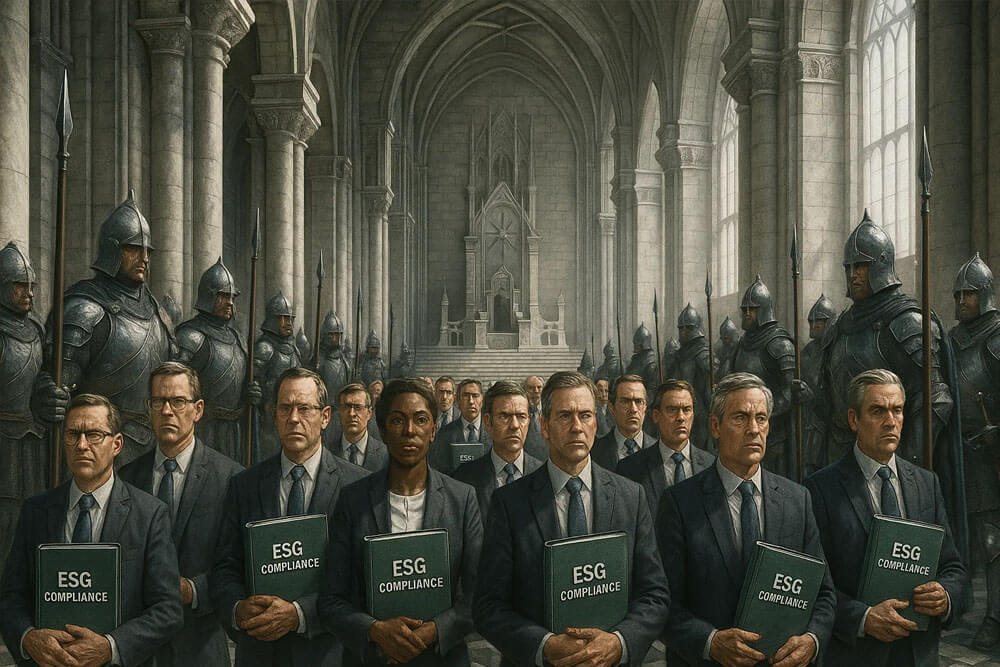
Tolkien’s world deserves better. And Amazon’s decision makes one thing painfully clear: they didn’t learn a thing from their first trip to the Shire.
How ESG Strings Will Warp Middle-earth
Fans need to understand: these ESG covenants are not abstract. They are deliverables. Amazon doesn’t just promise “to be mindful of diversity” — it promises to show it in ways that can be measured, reported, and photographed for annual ESG reports and investor decks.
That means:
1. The Quota Will Be Visible
DEI targets can’t hide in the background. For them to “count,” they must be present in promotional materials, major questlines, and key art. You will see them in cinematic trailers, not buried in obscure side quests. Gondor’s court might suddenly look like a modern UN general assembly — because that’s what scores points with ESG auditors.
2. The Narrative Will Bend
To hit representation targets, storylines will be reworked or invented wholesale. Want to show female leadership in a culture Tolkien depicted as patriarchal? That’s a +1 for the metrics. Need more racial diversity in the Fellowship-style adventuring party? Another +1. Each change pushes the game further from the source material.
3. The Lore Will Flatten
Tolkien’s genius was in creating distinct cultures with their own histories, aesthetics, and values. ESG checklists push toward cultural homogenization, where every faction looks like it belongs to the same HR diversity poster. This erases the differences that make Middle-earth feel real.
4. Climatic and Environmental Pacing Will Shift
SBTi climate targets may influence how Amazon designs the game’s servers, assets, and even the number of NPCs in high-load areas. That can mean fewer large-scale battles, simplified landscapes, or reduced environmental detail — all in the name of lowering “digital carbon emissions.”
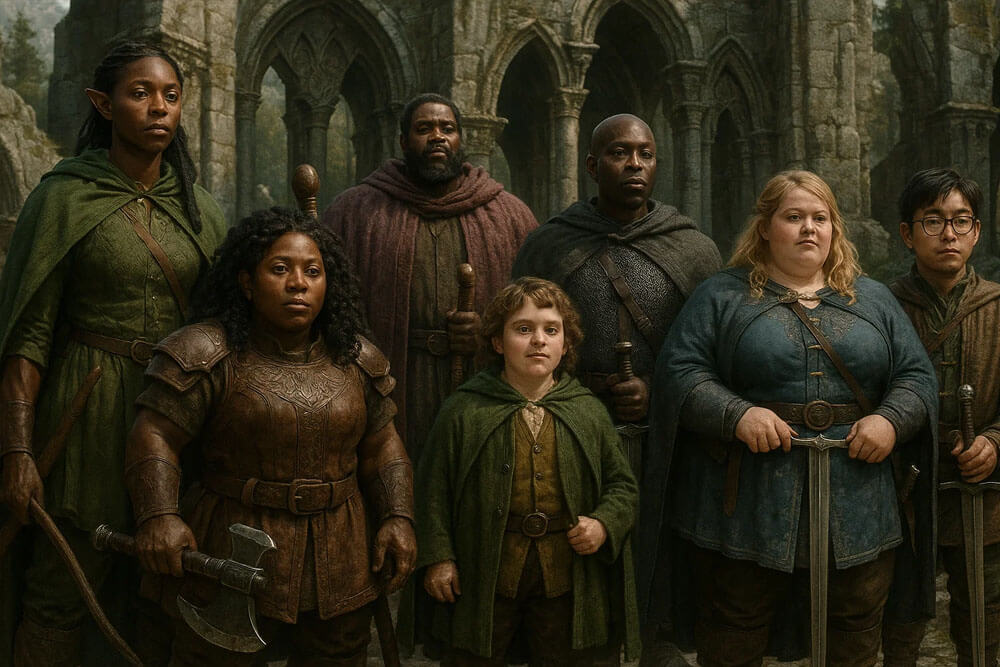
The Fans Will Notice
This isn’t a case where “only hardcore lore nerds will care.” The casual player logging in for escapism will feel the seams too. They might not know the term “ESG covenant,” but they’ll sense that Middle-earth has been filtered through a corporate PR lens. The immersion breaks, the magic fades, and word of mouth dies.
Why It’s a Guaranteed Backfire
The irony is that Tolkien fans are one of the least receptive audiences for visible ideological tinkering. These are readers and gamers who care about the integrity of a secondary world. They spot lore violations instantly. Forcing quotas into this setting is like spray-painting graffiti on Rivendell — you may impress the auditors, but you’ll lose the audience.

The ESG One Ring
In The Lord of the Rings, the One Ring is beautiful to look at and powerful to wield. It promises the bearer the ability to shape the world, to bend events to their will — but it corrupts everything it touches. Those who take it believe they can control it, but in the end, it controls them.
Amazon’s ESG loan is its One Ring.
- It offers cheap money — hundreds of millions saved in interest over time.
- It offers virtue points — the ability to parade “commitments” to diversity and climate at shareholder meetings and in glossy sustainability reports.
- And like the Ring, it comes with terms written by an outside power that demands obedience.
Once the Ring is on, the bearer cannot act freely. Every choice is bent toward serving its master — in this case, the ESG covenants and the ratings agencies that enforce them. Every creative decision in the LOTR MMORPG will now pass through the Eye of ESG: Does this scene, character, questline, or promotional image help meet the quota? If not, change it until it does.
Tolkien’s legendarium is a story about the corruption of the good by the lure of power and the slow erosion of freedom under an all-seeing will. The tragedy here is that Amazon has recreated that dynamic in the real world — not as allegory, but as contract law.
The One Ring in Tolkien’s world could only be unmade in the fires of Mount Doom. Amazon could have avoided putting it on in the first place. But they didn’t. They slipped it on willingly, and now they’re bound to serve it. The cost will be paid not just in dollars and KPIs, but in the soul of Middle-earth itself.
The Shill Playbook
When Amazon rolls out its PR push for the new Lord of the Ring MMORPG, expect the same interference tactics used during Rings of Power. This time, they will also bring in a new wave of “approved” voices — BIPOC and trans Tolkien “experts” and influencers who will vouch for Amazon’s changes in the name of “representation” and “modernization.” These individuals will be framed as authoritative voices, making it harder for critics to push back without being accused of prejudice. It’s a calculated shield, designed to deflect all criticism into the realm of identity politics.
Here’s what else to watch for:
- Gatekeeping the Lore – Claiming Tolkien would have supported modern representation quotas, despite zero textual evidence.
- Ad Hominem Attacks – Branding dissenters as trolls, racists, or bigots to shut down debate.
- Trailer Hype Over Substance – Flooding YouTube and social media with reaction videos focused on graphics and cinematics while ignoring story or lore integrity.
- Astroturf Praise – Coordinated “fan” accounts boosting early impressions, often with copy-paste talking points.
- Moving the Goalposts – Arguing that Tolkien’s world was “always diverse” by redefining terms and using selective quotes out of context.
- Gaslighting the Backlash – Dismissing legitimate criticism as a “minority of loud voices” while downplaying negative metrics.
- The Unity Appeal – Calling for fans to “come together” and “give it a chance,” buying time until launch when criticism is harder to undo.
Know these moves. Call them out. And remind everyone — the loyalty of Tolkien fans belongs to Middle-earth, not to Amazon’s marketing department.
Conclusion: Protect the Shire
Tolkien’s world has endured for nearly a century because it speaks to something deeper than politics, quotas, or corporate talking points. It is a living mythology — a refuge from the noise of the present, a reminder that there are still places where honor, courage, and beauty matter more than metrics.
Amazon has already shown, with Rings of Power, that it will compromise that refuge for the sake of spectacle and surface-level gestures. Now, with the Lord of the Rings MMORPG, they’ve gone further: they have signed a deal that bakes those compromises into the financial foundation of the game.
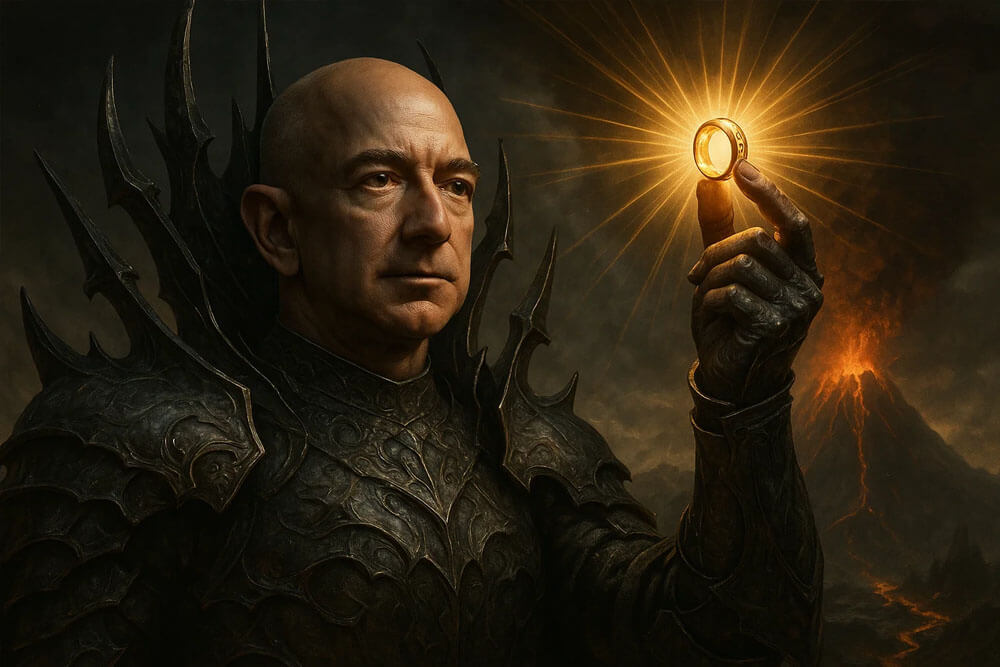
This is not creative drift. It’s not bad luck. It’s not a “mistake” they can patch in a future update. It’s a deliberate choice to trade Tolkien’s integrity for cheap money and a seat at the ESG virtue table.
If you care about Middle-earth, you must care about this. Demand answers. Share this article. Share the receipts. Refuse to be placated by trailers and press releases. When they tell you the quotas and climate targets won’t change the story, show them the SEC filings, the leaked KPIs, the 10-K page that proves otherwise.
Amazon has already shown, with Rings of Power, that it will compromise that refuge for the sake of spectacle and surface-level gestures. Now, with the Lord of the Rings MMORPG, they’ve gone further: they have signed a deal that bakes those compromises into the financial foundation of the game.
This is not creative drift. It’s not bad luck. It’s not a “mistake” they can patch in a future update. It’s a deliberate choice to trade Tolkien’s integrity for cheap money and a seat at the ESG virtue table.
If you care about Middle-earth, you must care about this. Demand answers. Share this article. Share the receipts. Refuse to be placated by trailers and press releases. When they tell you the quotas and climate targets won’t change the story, show them the SEC filings, the leaked KPIs, the 10-K page that proves otherwise.
And beware the quislings. During Rings of Power, Amazon had a ready stable of influencers and fan sites — like Nerd of the Rings, TheOneRing.net, and others — willing to run interference, dismiss legitimate criticism, and brand concerned fans as trolls or bigots. Expect them to be deployed again, this time with a more diverse roster of “official” Tolkien spokespeople to make resistance more costly. Their job is to make you doubt your own eyes while the lore is gutted in plain sight.
Don’t fall for it. This time, you know the playbook.
In Tolkien’s world, the Shire only survived because ordinary people stood up when it counted. This is one of those moments. Protect the Shire. Protect the legendarium. And never let Amazon forget that Middle-earth belongs to the fans who cherish it — not to the bankers who mortgage it.
—Wolfshead
Related Videos
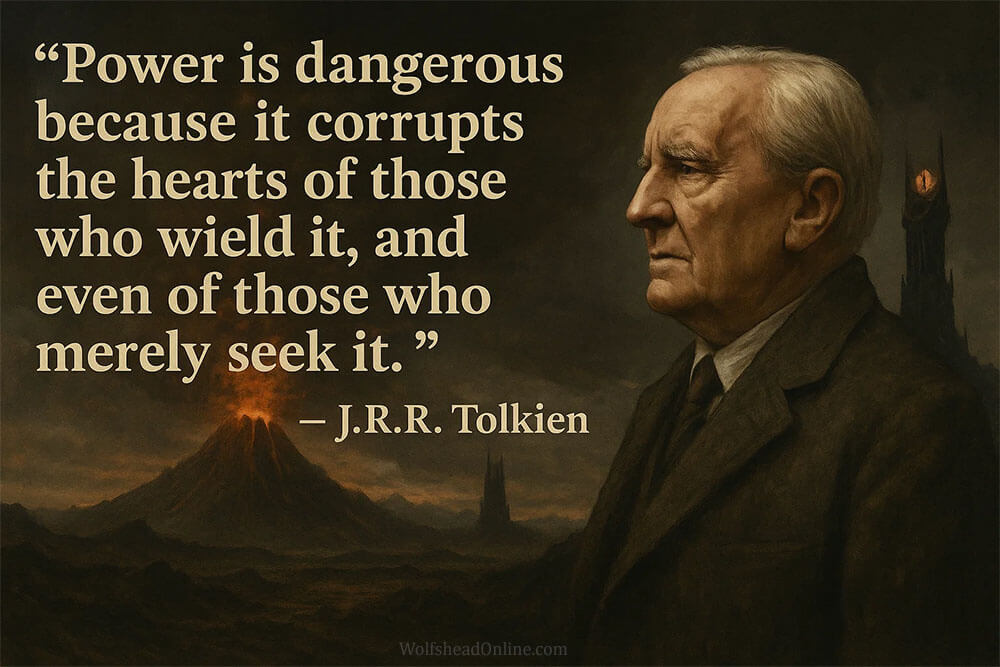

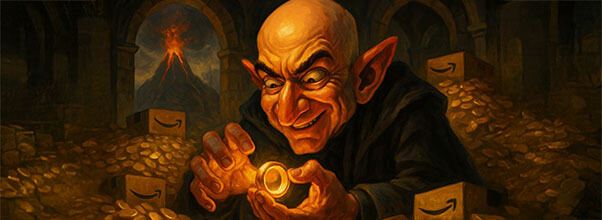


Rings of Power is the best warning people could have.
It breaks my heart that Standing Stones Games couldn’t keep up the legacy of the Lord of the Rings game. Turbine respected the lore and their zones and quests were wonderful.
It is awful how they infest the wonderful world of Tolkien with their ideology.
I used to think all of the gratuitous wokeness (in film, TV, books, and video games) was coming from developers and activists. That was all wrong. It is coming directly from ESG mandates. It’s all astro turf.
I think one of the main quests will be the story of a fat African Elf lesbian woman in a polygamous relationship an Asian Dwarf woman and a transsexual Hobbit who is a mixture of Middle Eastern and Japanese and how they are fighting against those who tell them they can’t have children, because it’s biologically impossible and your job is to go around and lecture everyone and guilt trip them for it so they show remorse for how close-minded they are.
Such a game in my opinion simply cannot be appealing since most of the focus will be on sending some message to the players and if that is removed, the actual game will feel very boring and uninspired. I tried looking at New World from that perspective, ignoring all the propaganda and as game it felt very boring and lacking inspiration. They didn’t do anything to make it stand out from previous MMORPGs, in fact it felt more limited and worse.
This one won’t be any different, all the money they can get for the game won’t amount to anything.
To compare it to Vanilla WoW, LOTRO, EQ, RuneScape, the game will feel inferior, it will only have nice modern graphics and action combat, which will serve as to trick the most gullible and feeble minded into thinking it’s good, because graphics and action combat certainly never get old or boring and they compensate for lack of fun gameplay, engagement and immersion.
I had more fun playing the LOTRO jank for almost 2 years and if they didn’t make it woke, I would still play it, even the private server is worth playing. But nothing new in terms of MMORPG excites me anymore, it just feels like they are only advancing the graphics while everything else is going backwards and feels even more limited compared to MMORPGs from 20 years ago in terms of player freedom. It all comes from developers who lack imagination and are just mentally lazy to even attempt at thinking, they only get paid to make every game they work on have Warcraft Rumble graphics and gameplay freedom of Angry Birds.